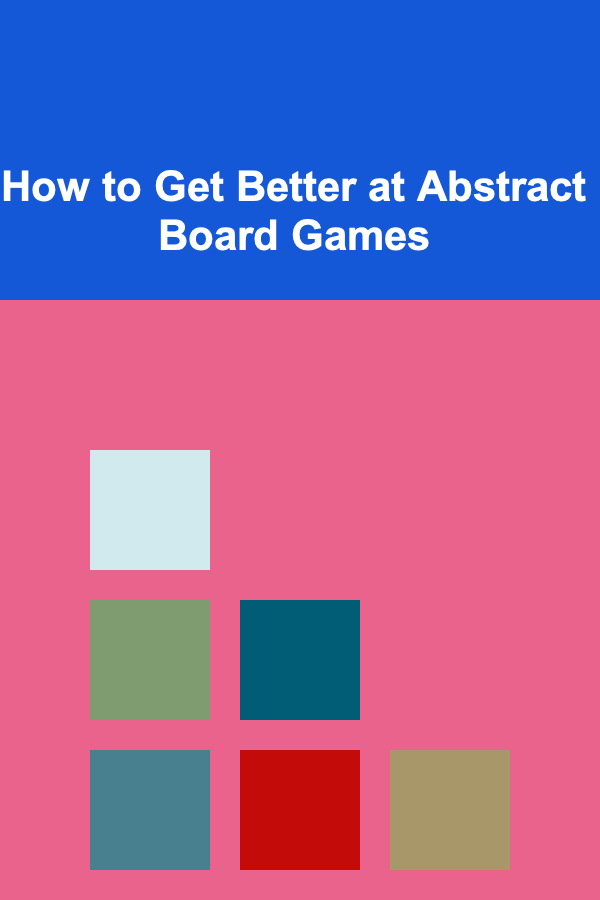
How to Get Better at Abstract Board Games
ebook include PDF & Audio bundle (Micro Guide)
$12.99$9.99
Limited Time Offer! Order within the next:

Abstract board games have long been a cherished genre among tabletop game enthusiasts. These games, which lack elements of luck, often require players to rely entirely on strategy and skill. Whether you're into classics like Chess , Go , Checkers , or modern abstracts like Azul or Hive, improving your ability to succeed in these games is an exciting challenge that demands deep thinking, practice, and self-reflection.
In this article, we'll dive into effective strategies and techniques to enhance your performance in abstract board games. The goal is to provide you with the tools you need to think critically, plan effectively, and refine your strategies.
Understanding Abstract Board Games
Before delving into the methods for improvement, it is crucial to understand what abstract board games are and why they require a different approach compared to games that incorporate elements of luck (such as dice rolls or card draws).
Key Characteristics of Abstract Board Games:
- No Randomness: Abstract board games typically exclude elements like dice rolls or shuffled cards. Every decision you make has a direct consequence on the game, making them a pure test of strategy.
- Minimal Theme: These games often have a minimalist or abstract theme, with the focus primarily on mechanics and strategic depth.
- Perfect Information: In most abstract games, all information about the game is available to all players at all times. There are no hidden cards or dice rolls, which makes analyzing and predicting moves more important than in other genres.
Games like Chess and Go are perfect examples of abstract strategy games. Both offer an incredible depth of complexity despite having relatively simple rules and straightforward gameplay.
The Importance of Strategy in Abstract Games
In abstract games, strategic thinking is paramount. Unlike games with random elements, where luck can sometimes tip the scales, abstract games give you full control over your success or failure. Here are some strategies that can help sharpen your overall gameplay:
1. Focus on Fundamentals
While each abstract game has its own unique set of rules, focusing on the fundamentals is essential for excelling in any game. In Chess , this would mean understanding key principles like controlling the center, developing pieces early, and protecting your king. In Go, mastering concepts like "territory" and "life and death" shapes is crucial.
For beginners, focusing on core principles will not only make it easier to navigate the game but will also allow for more advanced strategic choices once the basics are internalized. So, before diving into complex strategies, ensure that you're comfortable with the fundamental principles of the game.
2. Develop a Deep Understanding of the Rules
Abstract games may appear simple at first glance, but they often have layers of complexity hidden within their rules. To get better, take the time to understand not just the rules themselves, but the underlying logic behind them. For example, Go's capturing mechanics may seem straightforward, but understanding how groups of stones interact within the larger context of the board opens up entirely new avenues for strategic depth.
3. Master Opening Moves
Many abstract games have opening strategies or moves that are well established, especially in games like Chess and Checkers . These opening moves often lay the groundwork for a more favorable middle and endgame. Knowing these opening strategies (such as the Ruy Lopez or Sicilian Defense in Chess) gives you a strong start, saving valuable time and energy.
When learning an opening, focus on its principles (like development, control of the center, and piece coordination) rather than memorizing individual moves. Once you've mastered a few common openings, you'll be able to improvise and adapt to your opponent's actions more fluidly.
4. Think Ahead: Anticipate Opponent Moves
In abstract board games, being able to think ahead and anticipate your opponent's next moves is a vital skill. Many games, such as Chess and Go, allow you to play out multiple moves in your head and predict how your opponent might respond. This skill, known as "looking ahead" or "visualization," can be developed with practice.
Start by planning just one move ahead, then gradually increase your analysis to two or three moves ahead. As you gain confidence, you'll begin to notice patterns and anticipate strategies. Go, for instance, involves evaluating the entire board and thinking several moves ahead about where groups of stones will land.
5. Learn from Your Mistakes
One of the most effective ways to improve is by analyzing your losses. Each mistake is a learning opportunity. After each game, whether won or lost, take the time to reflect on the moves you made and ask yourself the following questions:
- Did I miss any better moves?
- What would have happened if I played differently?
- Was my strategy too aggressive or too passive?
Reflecting on your mistakes gives you valuable insight into areas where you can improve. Try to view losses not as failures but as stepping stones to improvement.
6. Study Tactics and Patterns
In abstract games, certain tactical patterns emerge repeatedly. These patterns can give you the edge over opponents who aren't aware of them. For example, in Chess , motifs like pins, forks, skewers, and discovered attacks are crucial to master. Similarly, in Go, concepts like "ko" and "atari" frequently come up and can be leveraged for advantage.
There are numerous resources available online and offline to study these tactics. Books, YouTube tutorials, or online strategy guides can all provide in-depth explanations of common tactical patterns and their applications.
7. Adapt Your Playstyle
Different opponents require different approaches. If you find that you're consistently losing to a certain type of strategy, take the time to adjust your playstyle to counter it. Chess players, for instance, may use different strategies based on whether they're playing against an aggressive attacker or a defensive strategist.
In addition to adapting to different styles, also make sure that you're not overly predictable in your own gameplay. Keeping your opponent guessing forces them into uncomfortable positions, allowing you to dictate the flow of the game.
8. Control the Tempo
In many abstract games, controlling the pace of the game is a key advantage. For example, in Go, a player who is always reacting to the opponent's moves can quickly fall behind. Instead, try to set the tempo by choosing where on the board you want to make the most significant impact.
In Chess, controlling the tempo means dictating the flow of moves, ensuring that your opponent is always responding to your actions. This can be done by forcing your opponent into defensive moves or creating situations where they must address multiple threats at once.
9. Endgame Mastery
Most players focus a great deal of energy on the opening and middle game, but often overlook the endgame. In reality, endgames are often where games are won or lost. Understanding endgame strategies is especially important in games like Chess, where knowing how to convert a small advantage into a victory is vital.
Learn key endgame concepts such as pawn promotion , king and pawn against king , or opposition in Chess. In Go, endgames involve accurately calculating the final score of territories and groups, so being familiar with endgame patterns in that game is also critical.
10. Continuous Learning and Practice
The path to becoming a better abstract board game player requires constant learning and practice. Whether you're playing against friends, family, or online opponents, consistent practice is essential. If you're serious about improving, consider studying games played by grandmasters or top-ranked players. Many Chess games, for example, are available for analysis, and online platforms offer in-depth breakdowns of professional matches.
Additionally, play regularly to internalize the strategies you've learned. Repetition, combined with thoughtful reflection, will cement the concepts and tactics you need to succeed.
Tools and Resources for Improvement
In the digital age, there are many resources available to help you improve your skills in abstract board games:
- Online Platforms : Websites like Chess.com , Lichess , and KGS Go Server allow players to play and compete against others from around the world. These platforms also offer puzzles and analysis tools to help you improve.
- Books and Magazines : Classic strategy books like "My Great Predecessors" by Garry Kasparov or "The Life and Death of a Game" by Edward Lasker are invaluable resources for deepening your understanding of abstract strategy games.
- Video Tutorials: YouTube is a goldmine of strategy videos. Channels dedicated to Chess, Go, and other abstract games provide tutorials on opening strategies, tactics, and common mistakes.
- Analysis Software : Tools like Stockfish (for Chess) or Lizzie (for Go) can analyze your games and provide feedback on your decisions. These tools break down your moves, suggest alternatives, and help you understand your mistakes in detail.
Conclusion
Improving at abstract board games is a rewarding journey that demands strategy, critical thinking, and continual learning. By mastering the fundamentals, studying tactics, reflecting on mistakes, and practicing consistently, you'll gradually enhance your skills. Keep in mind that becoming a true master of abstract games takes time and perseverance. With the right mindset, you can unlock new layers of enjoyment and success in every game you play.

How to Avoid Multitasking and Improve Focus
Read More
How to Cook Healthy for a Crowd
Read More
How to Create a Home Security System Without Monthly Fees
Read More
How to Save Money on Home Insurance Without Losing Coverage
Read More
Unearthing Unique Adventure Travel Destinations: A Guide to Off-the-Beaten-Path Experiences
Read More
Grasping Quantum Volume as a Metric
Read MoreOther Products

How to Avoid Multitasking and Improve Focus
Read More
How to Cook Healthy for a Crowd
Read More
How to Create a Home Security System Without Monthly Fees
Read More
How to Save Money on Home Insurance Without Losing Coverage
Read More
Unearthing Unique Adventure Travel Destinations: A Guide to Off-the-Beaten-Path Experiences
Read More